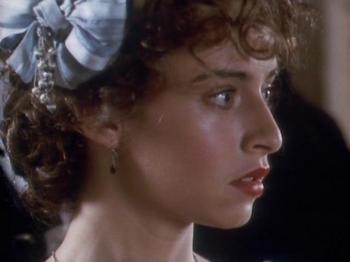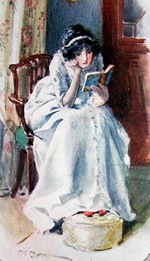 From the desk of Virginia Claire:
From the desk of Virginia Claire:
In my Jane Austen Seminar this semester we had been talking about Austen’s juvenilia for a while but a now have shifted our focus to Northanger Abbey. It was very interesting looking at the transition between a story like Love and Friendship to Northanger because we can pretty clearly see Austen’s growth as a novelist. I fall in love with Northanger Abbey more and more each time I read it. It is such a wonderful coming of age story. Catherine Morland is a charming heroine though from the very beginning of the novel Austen tells us that “No one who had ever seen Catherine Morland in her infancy would have supposed her born to be a heroine. Her situation in life, the character of her father and mother, her own person and disposition, were all equally against her.” (Chapter 1). I love that Austen takes Catherine’s normalcy and turns it around to make her a heroine. For me what is so endearing about Catherine is the fact that I see her as almost every young girl. Who in high school or as a teen was not blinded by a friend or just naïve in general? Maybe I was just a little more personally sheltered until I hit college but I can see where Austen is coming from with Catherine’s growth. She grows up and begins to see the world a little more realistically.

Catherine Morland may at times get accused of being a goose by critics, but not this one! If she is a goose at all it is her goosey parts that I love the best. She is so easily teased by Mr. Tilney it is cute. One girl in my class pointed out that it was like being on a playground and a little boy was pulling your pigtails to get your attention. It is only when your mother tell you later that “he is doing that because he likes you” that it begins to make a little sense. I sometimes feel like Mr. Tilney is just pulling Catherine’s pigtails. He knows he is witty and clever so sometimes he talks over her head but he normally tries to explain it to her whether she gets it or not. A classic example of this is when they are dancing and Mr. Tilney makes the connection between Country dances and marriage. Mr. Tilney says,
“I consider a country-dance as an emblem of marriage. Fidelity and complaisance are the principal duties of both; and those men who do not choose to dance or marry themselves, have no business with the partners or wives of their neighbours.”
“But they are such very different things!”
” – That you think they cannot be compared together.”
“To be sure not. People that marry can never part, but must go and keep house together. People that dance only stand opposite each other in a long room for half an hour.”
“And such is your definition of matrimony and dancing. Taken in that light certainly, their resemblance is not striking; but I think I could place them in such a view. You will allow, that in both, man has the advantage of choice, woman only the power of refusal; that in both, it is an engagement between man and woman, formed for the advantage of each; and that when once entered into, they belong exclusively to each other till the moment of its dissolution; that it is their duty, each to endeavour to give the other no cause for wishing that he or she had bestowed themselves elsewhere, and their best interest to keep their own imaginations from wandering towards the perfections of their neighbours, or fancying that they should have been better off with anyone else. You will allow all this?”
“Yes, to be sure, as you state it, all this sounds very well; but still they are so very different. I cannot look upon them at all in the same light, nor think the same duties belong to them.”
“In one respect, there certainly is a difference. In marriage, the man is supposed to provide for the support of the woman, the woman to make the home agreeable to the man; he is to purvey, and she is to smile. But in dancing, their duties are exactly changed; the agreeableness, the compliance are expected from him, while she furnishes the fan and the lavender water. That, I suppose, was the difference of duties which struck you, as rendering the conditions incapable of comparison.”
“No, indeed, I never thought of that.” (Chapter 10)
 This passage is rich with things to mention but what I want to point out is that Catherine does not really understand where Mr. Tilney is going with this. In fact it is hard of even the reader to understand but we can sort of see what he is getting at. Catherine’s misunderstanding of so many things around her can remind the reader (at least this reader) that the heroine is not so very different from herself. Catherine makes mistakes, misjudges people, is fooled by her supposed friends and can’t see things that are happening right in front of her and yet we still find her endearing, perhaps because Catherine seems so truly human and that’s what makes her a heroine. She is not a great beauty, or a great wit or anything really extraordinary and yet she seems delightful to us. My reason for falling in love with Catherine Morland is that though she is fooled she does has a strong resolution and can step up to the plate. When she is sent away from Northanger Abbey she is able to get herself home without any fainting fits, robberies or other calamities. Catherine is a fully competent heroine even if she is a little scatter brained at times…. But then again who isn’t?
This passage is rich with things to mention but what I want to point out is that Catherine does not really understand where Mr. Tilney is going with this. In fact it is hard of even the reader to understand but we can sort of see what he is getting at. Catherine’s misunderstanding of so many things around her can remind the reader (at least this reader) that the heroine is not so very different from herself. Catherine makes mistakes, misjudges people, is fooled by her supposed friends and can’t see things that are happening right in front of her and yet we still find her endearing, perhaps because Catherine seems so truly human and that’s what makes her a heroine. She is not a great beauty, or a great wit or anything really extraordinary and yet she seems delightful to us. My reason for falling in love with Catherine Morland is that though she is fooled she does has a strong resolution and can step up to the plate. When she is sent away from Northanger Abbey she is able to get herself home without any fainting fits, robberies or other calamities. Catherine is a fully competent heroine even if she is a little scatter brained at times…. But then again who isn’t?
Virginia Claire our Austen at Large roving reporter is a college student studying English literature and history who just returned from her time studying abroad in Bath England and working as an intern at the Jane Austen Centre. She is the Regional Coordinator of JASNA North Carolina and a lifelong Janeite. She will be sharing her thoughts on all things Austen this semester and remembering her travels in Austenland.
That is a great illustration. I must confess Northanger Abby didn’t keep my attention very well. I had a hard time understanding it, reading between the lines like in Pride and Prejudice. This has shed light on maybe why. Catherina does seem out in left-field many times. But like you said she wasn’t a weak person, what she believed she held to with firm resolution, even if it was misguided.
I loved Henry for loving such a simple, pleasant girl. She didn’t pretend she was someone she wasn’t. She didn’t need too; he loved her the way she was.
I think I will try reading it again!
LikeLike
I’ve always loved Northanger and felt closer to Catherine Morland than most of Austen’s other heroines, and not merely because we share the same first name! What book-lover hasn’t become so completely absorbed by a novel that it can sometimes be difficult to step back into the real world? Never to the same extent as Catherine herself, but I was always able to sympathise with her on that account. As you say, she’s so very normal- she makes mistakes but learns from them, picks herself up and carries on. What’s not to love?!
PS: Virginia, I really enjoyed reading your blog from the Jane Austen Centre! I visited Bath before Christmas and went there hoping to catch one of your talks but must’ve picked one of your off days! I’m determined to get back to the city in September for the Jane Austen festival, it looks like great fun! (^_^) Good luck with the rest of your course!
LikeLike